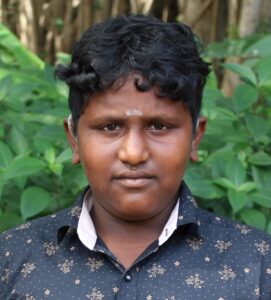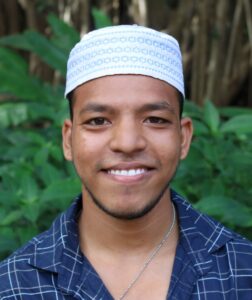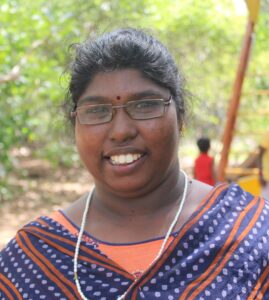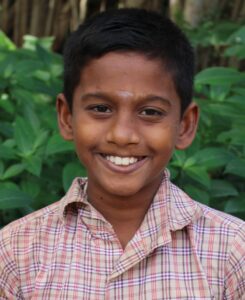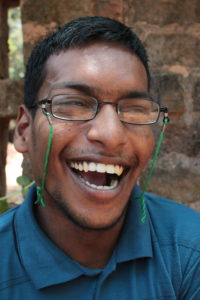Students under our day care programme
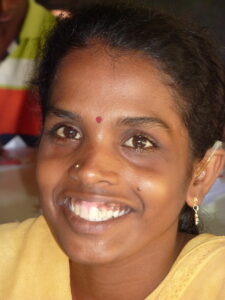 Nagammal
Nagammal
was born in 1989 in the nearby village into a family with three older brothers. She was unwanted and her mother had tried to abort her. When she first came to the “Old Playground” she was about three and a half years old and was not able to walk because of severe undernourishment. She was weak and constantly ill. Over the years she has needed a lot of healthcare for all kinds of diseases including tuberculosis. Since 2003 we were able to offer day care and lunch which helped to stabilize her health. Nagammal was our first child with a hearing impairment. At that time, we had no experience with hearing aids and speech therapy. It was a long process until Nagammal finally received her first hearing aids when she was around five years old. For the testing and purchasing, we had to go to Chennai which was at that time a 4-5 hour drive on terrible roads. Nagammal is cognitively fine but is very shy. She has profited most from our program over the years. Selvi taught her reading and writing at Deepam, but she is not able to talk properly because she got her hearing aids too late and had no family support. We have taught Nagammal various handicrafts such as embroidery, greeting card design and candle-making. Nagammal has become much more confident and is a great help with the smaller children. Nagammal feels safe at Deepam and is well respected. We have an agreement with her parents that Nagammal can stay at Deepam for continuous health-care and as a helper. She has her own savings account where we put a monthly contribution for her future needs.
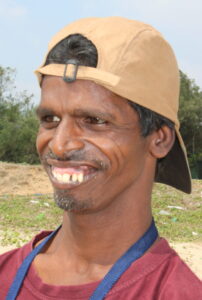 Sundar was born in 1985. Having severe learning disabilities, the majority of his skills are limited. Over the years, we have managed to teach him the basic colors and counting up to 20. Sundar is able to do small jobs at Deepam and manages well socially. His concentration span is extremely low and he will never be able to have a normal job. Nevertheless, Sundar is always in a good mood and sings all day long. In the village he is always seen on the road and accepted by everybody for his good nature. Sundar is certainly one of the most happy beings!
Sundar was born in 1985. Having severe learning disabilities, the majority of his skills are limited. Over the years, we have managed to teach him the basic colors and counting up to 20. Sundar is able to do small jobs at Deepam and manages well socially. His concentration span is extremely low and he will never be able to have a normal job. Nevertheless, Sundar is always in a good mood and sings all day long. In the village he is always seen on the road and accepted by everybody for his good nature. Sundar is certainly one of the most happy beings!
Akash was born in 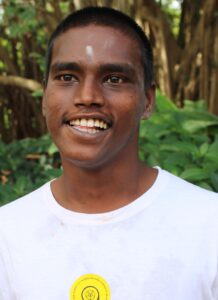 2002. He had epileptic fits immediately after he was born and needs to take continuous medication. Akash has a learning disability and behavioural disorder with autistic features. He comes from a poor family with parents who have not received formal education. His father struggled with alcohol addiction and died through suicide a few years ago. His mother has always had to care for the children and sustain the family. We have known Akash since he was about two years old when he first came as an outpatient to Angelika for occupational therapy. Unfortunately, it was not possible to work with him continuously. Akash often had severe epileptic attacks and also became very sick with recurrent fevers and it took months to find out that he had a specific type of tuberculosis infection. For nine months he was under strong medical treatment. To ensure that others did not contract tuberculosis, he could not come to Deepam during this period. Meanwhile his mother found it more and more difficult to manage her son. She wanted to admit Akash into a boarding school, but he was refused because of his challenging behaviour. Therefore our team decided to try out taking Akash into our day-care program. This was a real challenge in the beginning as Akash needed one person to constantly watch him. He refused eye contact, was not toilet trained, was beating and provoking other children, disturbing and not participating in activities. Slowly his social behaviour improved and in individual sessions we focused on simple tasks to enable him to cooperate and concentrate. He has since made astonishing progress and is participating politely and enthusiastically in all the activities.
2002. He had epileptic fits immediately after he was born and needs to take continuous medication. Akash has a learning disability and behavioural disorder with autistic features. He comes from a poor family with parents who have not received formal education. His father struggled with alcohol addiction and died through suicide a few years ago. His mother has always had to care for the children and sustain the family. We have known Akash since he was about two years old when he first came as an outpatient to Angelika for occupational therapy. Unfortunately, it was not possible to work with him continuously. Akash often had severe epileptic attacks and also became very sick with recurrent fevers and it took months to find out that he had a specific type of tuberculosis infection. For nine months he was under strong medical treatment. To ensure that others did not contract tuberculosis, he could not come to Deepam during this period. Meanwhile his mother found it more and more difficult to manage her son. She wanted to admit Akash into a boarding school, but he was refused because of his challenging behaviour. Therefore our team decided to try out taking Akash into our day-care program. This was a real challenge in the beginning as Akash needed one person to constantly watch him. He refused eye contact, was not toilet trained, was beating and provoking other children, disturbing and not participating in activities. Slowly his social behaviour improved and in individual sessions we focused on simple tasks to enable him to cooperate and concentrate. He has since made astonishing progress and is participating politely and enthusiastically in all the activities.
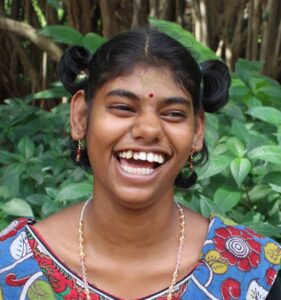 Nandini first came to Deepam for physiotherapy in 2004 when she was nine months old. She did not have a smooth start in life; while pregnant with Nandini, her mother attempted suicide by burning herself with kerosene and was hospitalized with 42% burns. Nandini was born prematurely with multiple disabilities (cerebral palsy and microcephaly). Since we have known her, Nandini has been undernourished and suffers from intestinal parasites. Her father has a severe alcohol addiction and does not work anymore. She has two younger brothers who attend regular schools. Due to Nandini’s family problems, her attendance at therapy was very irregular. When Nandini was seven and mature enough to join our day-care programme, she picked up significantly. Having no toilet at home and being delayed in her development, training her to use the toilet on her own was a big challenge. In 2016 we were able to help Nandini’s family to build their own toilet. Nandini loves to be in the group with the other children and is making steady progress. With her smiling eyes and her happy being, she is a ray of sunshine here at Deepam.
Nandini first came to Deepam for physiotherapy in 2004 when she was nine months old. She did not have a smooth start in life; while pregnant with Nandini, her mother attempted suicide by burning herself with kerosene and was hospitalized with 42% burns. Nandini was born prematurely with multiple disabilities (cerebral palsy and microcephaly). Since we have known her, Nandini has been undernourished and suffers from intestinal parasites. Her father has a severe alcohol addiction and does not work anymore. She has two younger brothers who attend regular schools. Due to Nandini’s family problems, her attendance at therapy was very irregular. When Nandini was seven and mature enough to join our day-care programme, she picked up significantly. Having no toilet at home and being delayed in her development, training her to use the toilet on her own was a big challenge. In 2016 we were able to help Nandini’s family to build their own toilet. Nandini loves to be in the group with the other children and is making steady progress. With her smiling eyes and her happy being, she is a ray of sunshine here at Deepam.
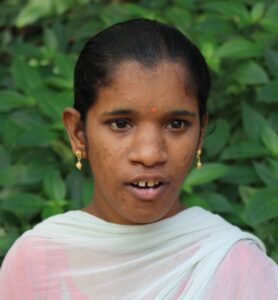 Sandiya first came to us when she was two years old. We remember her as a dirty little girl who always had a runny nose and was often sick. She was undernourished, tiny for her age and continuously had different types of intestinal parasites for which she got medical treatment. Sandiya’s parents are blood related. Born in 2003, weighing only 1900 grams she was kept in an incubator for a week. Although she has made a lot of progress since 2009 when we integrated her in into our day care group, she is still very underdevloped in her cognitive abilities and motor-skills. She has now learned to identify colours, match shapes and other objects and uses simple language and gestures to express herself. The test results confirmed that her hearing is fine but that she has a “sensory hearing loss”. This means that what she hears is not processed well in her brain and therefore she needs a lot of extra stimulation to learn to speak. Toilet training remained a constant challenge as she was used to defecating outside. Another draw-back for Sandiya is her delicate health – she is still sick often. In 2011 she was diagnosed with primary complex (the beginning of TB) and was given a full course of tuberculosis treatment. Her physical health has since improved, but she is still far too small for her age. She is now more concentrated and progress is seen in many areas. Sandiya is liked by everybody for her lovely personality.
Sandiya first came to us when she was two years old. We remember her as a dirty little girl who always had a runny nose and was often sick. She was undernourished, tiny for her age and continuously had different types of intestinal parasites for which she got medical treatment. Sandiya’s parents are blood related. Born in 2003, weighing only 1900 grams she was kept in an incubator for a week. Although she has made a lot of progress since 2009 when we integrated her in into our day care group, she is still very underdevloped in her cognitive abilities and motor-skills. She has now learned to identify colours, match shapes and other objects and uses simple language and gestures to express herself. The test results confirmed that her hearing is fine but that she has a “sensory hearing loss”. This means that what she hears is not processed well in her brain and therefore she needs a lot of extra stimulation to learn to speak. Toilet training remained a constant challenge as she was used to defecating outside. Another draw-back for Sandiya is her delicate health – she is still sick often. In 2011 she was diagnosed with primary complex (the beginning of TB) and was given a full course of tuberculosis treatment. Her physical health has since improved, but she is still far too small for her age. She is now more concentrated and progress is seen in many areas. Sandiya is liked by everybody for her lovely personality.
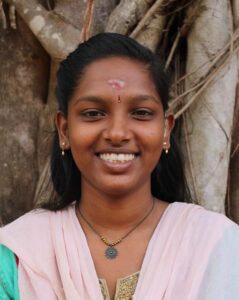 Hema was four years old when she was referred to us by her Kindergarden teachers in 2009. We recommended doing an audiometry test which confirmed that she was hearing impaired and that she needed to wear hearing aids and she would require intensive speech therapy. Her parents were informed about a few special schools, which are further away, and provide special education for hearing impaired children. As Hema is quite active and unfocused her parents decided that Hema should join our day care programme at Deepam where she would get individual attention and would also get daily sessions of speech therapy with Selvi and Gopal. After two years and considerable progress, we suggested that Hema should trial re-integration in a mainstream school. Aikayam School was ready to accommodate Hema into the first grade. We continued to assist Hema in the afternoons for speech-therapy, her home-work and for the maintenance of her hearing aids. Unfortunately Hema’s parents gave little support for her homework and after several months the teachers gave up as Hema was not able to follow in class. Now Hema is at Deepam for the full day where she gets a few individual sessions weekly where she learns to read and write Tamil and learn basic maths. Hema profits from the different activities which are offered at Deepam. Meanwhile she has become much more beautiful, content and concentrated. Also she is talking much more and is well articulated, especially as we were donated high quality hearing aids for her. She can read full chapters in Tamil and write complete sentences. In maths she can do simple calculations.
Hema was four years old when she was referred to us by her Kindergarden teachers in 2009. We recommended doing an audiometry test which confirmed that she was hearing impaired and that she needed to wear hearing aids and she would require intensive speech therapy. Her parents were informed about a few special schools, which are further away, and provide special education for hearing impaired children. As Hema is quite active and unfocused her parents decided that Hema should join our day care programme at Deepam where she would get individual attention and would also get daily sessions of speech therapy with Selvi and Gopal. After two years and considerable progress, we suggested that Hema should trial re-integration in a mainstream school. Aikayam School was ready to accommodate Hema into the first grade. We continued to assist Hema in the afternoons for speech-therapy, her home-work and for the maintenance of her hearing aids. Unfortunately Hema’s parents gave little support for her homework and after several months the teachers gave up as Hema was not able to follow in class. Now Hema is at Deepam for the full day where she gets a few individual sessions weekly where she learns to read and write Tamil and learn basic maths. Hema profits from the different activities which are offered at Deepam. Meanwhile she has become much more beautiful, content and concentrated. Also she is talking much more and is well articulated, especially as we were donated high quality hearing aids for her. She can read full chapters in Tamil and write complete sentences. In maths she can do simple calculations.
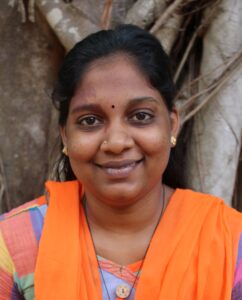 Dharani was born in 1997 and came first to us for physiotherapy when she was two years old. She suffers from epilepsy and is on constant medication. For some years Dharani was in mainstream schools but, as she is developmentally delayed, she was academically behind her peers. When she was twelve she finally joined our day care group and she was barely able to write her own name. In the other school there was no appropriate help for Dharani who requires more individual attention in order to be able to focus and to progress. Over a long period of time Dharani showed strange social behaviours, refused to participate in group activities and withdrew inwardly. Our Deepam team closely monitored and supervised Dharani to better understand how to support her development e.g. she was sent for some art-therapy sessions to support her emotionally.
Dharani was born in 1997 and came first to us for physiotherapy when she was two years old. She suffers from epilepsy and is on constant medication. For some years Dharani was in mainstream schools but, as she is developmentally delayed, she was academically behind her peers. When she was twelve she finally joined our day care group and she was barely able to write her own name. In the other school there was no appropriate help for Dharani who requires more individual attention in order to be able to focus and to progress. Over a long period of time Dharani showed strange social behaviours, refused to participate in group activities and withdrew inwardly. Our Deepam team closely monitored and supervised Dharani to better understand how to support her development e.g. she was sent for some art-therapy sessions to support her emotionally.
Dharani’s father died in 2004 of HIV and her mother was left with four adolescents. Dharani has two older sisters and one younger brother. They were living in a one room house made out of mud with a thatched roof which was leaking badly and was temporarily covered with a plastic sheet. In the tropics there are long periods without rain but the monsoon rains are extremely heavy. In 2011 we were able to help Dharani and her family, with funds from Deepam, to create a solid house.
Finally in 2013 Dr. Peter Prashant, the pediatric doctor from PIMS hospital who supports us tremendously, diagnosed Dharani with Sturge-Weber Syndrome which explains her medical condition. It is a congenital disorder (by birth) which is always accompanied by a red birth-mark on the face. Complications are calcifiction of tissue and loss of nerve cells in the brain, on the same side of the head as the birth mark, which often results in seizure disorders and muscle weakness on the side of the body opposite to the birth-mark. Another complication can be glaucoma which can lead to blindness. Therefore we make sure that Dharani’s eyes get checked regularly. Despite all of this Dharani has made great progress in recent years. She is ready to work harder to achieve something and participates more actively. We are very proud of her and encourage her a lot.
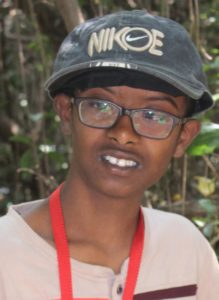 Chandru was born in 2007 with Down Syndrome, also called Mongolism or Trisomy 21. Since the age of 18 months he has been coming to Deepam regularly with his mother to receive physiotherapy and general stimulation. Chandru is delayed in all his milestones and we need to focus on the development of his speech. He is an extremely sweet and smart boy who is liked by everybody for his charm. His mother was still helping him a lot when he grew up and we insisted that he be toilet trained and that he learnt to eat alone and dress on his own. Our aim was to integrate him gradually into our day care programme which is proving more difficult than we had expected. Chandru’s behaviour is challenging at times as he is naughty, and adults tend to find this funny as he is quite sweet. We have talked several times at Deepam and made it very clear with his parents that we all need to have a clear and firm approach with Chandru in order to guide him and help him to develop appropriate social behaviour.
Chandru was born in 2007 with Down Syndrome, also called Mongolism or Trisomy 21. Since the age of 18 months he has been coming to Deepam regularly with his mother to receive physiotherapy and general stimulation. Chandru is delayed in all his milestones and we need to focus on the development of his speech. He is an extremely sweet and smart boy who is liked by everybody for his charm. His mother was still helping him a lot when he grew up and we insisted that he be toilet trained and that he learnt to eat alone and dress on his own. Our aim was to integrate him gradually into our day care programme which is proving more difficult than we had expected. Chandru’s behaviour is challenging at times as he is naughty, and adults tend to find this funny as he is quite sweet. We have talked several times at Deepam and made it very clear with his parents that we all need to have a clear and firm approach with Chandru in order to guide him and help him to develop appropriate social behaviour.
Dineshkarthik came to us in 2012 as a two year old boy. We referred him for an audiometry test. The result confirmed profound hearing impairment. The next step was to buy good quality hearing aids which Deepam supported financially as it was not affordable for his family. After some months of intensive speech-therapy we recommended a school for hearing impaired children in the town of Pondicherry, with a strict training-programme that aims to integrate students into mainstream schools. Unfortunately this did not work out for Dinesh as he was unable to sit quietly. Two years later his parents, who are eager to provide their son with good options, brought him back to Deepam only after no other school would take him. Though Dinesh is a very smart and sweet boy who made a lot of progress, he is a challenge for our group as he is constantly fidgeting and sometimes deliberately disturbs and hurts other children. He likes to help the smaller ones, but is a bit rough in his manners. We engage Dinesh in physical tasks, such as little garden jobs and we take him to the swimming pool and for therapeutic horse riding. Basic education is offered in one-to-one classes and he is able to read and write basic Tamil (the local language here) and is able to do simple addition and subtraction. With individual sessions of speech-therapy his talking has also improved.
As Dinesh is intelligent, in 2019 we suggested to his parents that they enroll him in a government school for children with hearing impairments, so he could get his official exam certificates that would benefit his future. He did well in the school, however during the 20 month Covid-19 lockdown while his school was closed, he came to Deepam. His parents could see the difference in what he was gaining at Deepam compared to the other school, and they requested he stay at Deepam, despite us not being able to provide exam certificates. We agreed that he could stay at Deepam and we would continue giving him individual classes, speech therapy, life skills and vocational training.
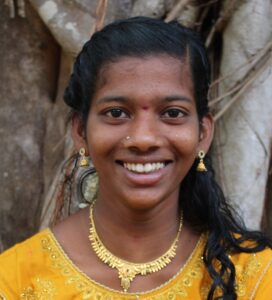 Nivetha was born in 2005 and has one older brother, Ruthrapathi, who is hearing impaired and who came to Deepam first. Both children are often left at home alone as their mother works on construction sites to earn income for the family; their father left home and remarried when they were small. Nivetha’s development was delayed, and she came to Deepam in 2016 (aged eleven) with a diagnosis of attention deficit hyperactivity disorder (ADHD). Before coming to Deepam she had been attending a mainstream school, however was asked to leave because of her difficulties reading, writing and concentrating. Her academic level is low and she has difficulty focusing. Her fine motor skills are good and she has been particularly enjoying sports classes since joining Deepam.
Nivetha was born in 2005 and has one older brother, Ruthrapathi, who is hearing impaired and who came to Deepam first. Both children are often left at home alone as their mother works on construction sites to earn income for the family; their father left home and remarried when they were small. Nivetha’s development was delayed, and she came to Deepam in 2016 (aged eleven) with a diagnosis of attention deficit hyperactivity disorder (ADHD). Before coming to Deepam she had been attending a mainstream school, however was asked to leave because of her difficulties reading, writing and concentrating. Her academic level is low and she has difficulty focusing. Her fine motor skills are good and she has been particularly enjoying sports classes since joining Deepam.
Abdulmajith was born with cerebral palsy in 2001 in another state where his family were temporarily staying for work. He was a home birth and was not taken to hospital. At the age of three, he went to a special school for two years and then to a mainstream government school until 8th standard until he left due to not being up to the level required. He then spent three years at a hostel in Pondicherry attending a special school before coming to Deepam when he was 17. Abdul has a learning disability, chest deformity, walks with a limp and has difficulty with gross and fine motor skills and hand/eye coordination. However, he is developing his academic and functional skills through practical use (e.g. measuring materials, updating the calendar, following handicraft patterns). He primarily spends his time in the vocational centre where we are teaching him practical skills for the future. His biggest wish is to become a mechanic, which is most likely unrealistic, however with lots of repetition and support, he is picking up an ever-increasing array of craft skills and is particularly enjoying the pedal saw. Abdul is a sociable young man who loves chatting and getting to know everyone.
Sathiya was born in 1992 as a twin. Both girls were small and stayed in an incubator for a few days, but, sadly, her twin sister died when she was eight months old. It was around this time her parents noticed that Sathiya was delayed meeting her milestones and that her right hand was paralysed. It was later confirmed that she has right side hemiplegia. When Sathiya came to Deepam as an eight-year-old in 2000, she was unable to talk, dress herself or play by herself and her mother did everything for her. Sathya was very active and not used to doing simple things or listening to instructions.
Sathiya has been attending our day care programme since 2003 when we got our first school bus. Now she has blossomed into a young woman who is able to understand and engage in conversations, walk independently (with only a mild limp) and engage in activities. We provide a specialist splint for her right hand to help with her spasticity, but she manages quite well with her left. Unfortunately, she developed epilepsy in 2007 and now requires constant medication which has a side effect of weight gain. She still needs some assistance with personal hygiene and dressing due to her hemiplegia, but she is improving and participating more in life skills such as helping proudly the cleaners at Deepam. We plan to continue developing her vocational skills and hopefully one day she can transition into work.
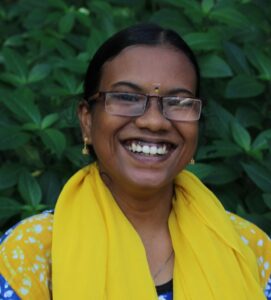 Sumitra was born in 2001 and came to Deepam when she was 10 years old. She is from Pondicherry (our nearest town) which is further away than we normally consider taking children from, so we declined her. However, her parents kept requesting for Sumitra to come to us, and in the end the whole family moved from Pondicherry to our local village of Kuilapalayam so we would take her. Sumitra’s strength of will and her parents support, understanding and motivation to help their daughter is refreshing for us to experience.
Sumitra was born in 2001 and came to Deepam when she was 10 years old. She is from Pondicherry (our nearest town) which is further away than we normally consider taking children from, so we declined her. However, her parents kept requesting for Sumitra to come to us, and in the end the whole family moved from Pondicherry to our local village of Kuilapalayam so we would take her. Sumitra’s strength of will and her parents support, understanding and motivation to help their daughter is refreshing for us to experience.
Sumitra was shy and rigid when she first came but has developed into a lovely young lady. She had normal early childhood development. She came to us following several schools refusing to work with her due to a suspected learning disability and ‘emotional issues’. Once Sumitra saw Deepam, she was determined to come to us. Despite her motivation to be at Deepam however, it was not an easy task for her to adopt Deepam’s program. Some activities she refused to do, and it took a long time for her to hold a pencil or crayon. Slowly, we discovered that she had undergone emotional trauma; verbally and physically punished and teased by her grandfather due to not being good at school. She has not fully overcome this, but she is taking homeopathic remedies to reduce the trauma and gradually she is becoming a great student. She has learned handicrafts, tailoring, painting, clay work, swimming, dancing, singing, sport and has even started to read and write in Tamil and learn simple maths. She loves cooking and this has become one of the main motivations and tools for teaching. With consistent and regular repetition, she is learning to read and write vegetable names and recipes. She mainly studies in the vocational training centre and is taking on more responsibilities at Deepam (for example, caring for the indoor plants, which she does loyally).
Sumitra has a strong will that we love – after all, it is her strong will that brought her to us. She dreams of having a small restaurant and we hope that with her motivation and our support, she will achieve that dream one day.
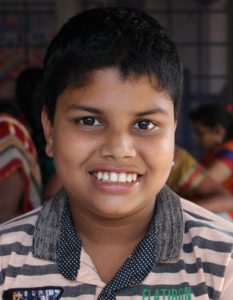 Kishore was born to blood-related parents in 2005 following a normal delivery. His early development was as expected until he was two years old when he experienced unexpected fits. He has been admitted to the ICU on a number of occasions due to these fits and now takes medication to manage them. He went to a large school in Pondicherry with no individual classes, so his parents brought him to Deepam in 2016 with reports of behavioural issues and delayed motor skill development.
Kishore was born to blood-related parents in 2005 following a normal delivery. His early development was as expected until he was two years old when he experienced unexpected fits. He has been admitted to the ICU on a number of occasions due to these fits and now takes medication to manage them. He went to a large school in Pondicherry with no individual classes, so his parents brought him to Deepam in 2016 with reports of behavioural issues and delayed motor skill development.
Kishore did not develop secondary sexual characteristics appropriate to his age, such as body hair, so we referred him for a hormone test when he was 15 years old. This identified that he had low testosterone levels and he is now taking tablets for this. At Deepam, Kishore engages well with the group and in individual sessions. Sometimes he has difficulty focusing and he will try to test his boundaries, however he is a kind and considerate boy who is often seen taking care of his less able peers. Kishore receives academic classes and occupational therapy and we hope that in the future he will be able to develop the vocational skills he requires for employment.
Puroshothaman had a normal birth in 2009. He fell out of bed the next day and stayed in an incubator for two days but continued to have normal development and meet milestones as expected, other than a one-off severe epileptic fit when he was three years old. With time it was noticed that his speech articulation wasn’t as developed as it should be, and he had difficulty concentrating in class. His teacher brought him to us several times when he was struggling to keep up with the level of 3rd standard, complaining of disruptive behaviour. Once his parents agreed, he joined Deepam. Pushothaman’s family situation is sad. His father is an alcoholic and struggles to look after him, often beating him. His mother unfortunately committed suicide in March 2020 just days before Deepam had to close due to COVID-19 restrictions. Puroshot still has some difficulty with concentration and attention. He is receiving academic classes in Deepam but is slow to learn. He is also receiving occupational therapy to assess and work on his sensory needs which could be related to his traumatic childhood and home life. He’s a very shy and quiet boy but is slowly blossoming as he gains trust in us all at Deepam. We hope that with time, patience and care he will learn to manage his sensory needs well enough to focus better and learn what he needs to lead a fulfilling life. It is a joy to work with him and his rare smiles brighten the room.
Suresh was born in 1992 with Cerebral Palsy. When he was three years old, he had an epileptic fit which was treated with tablets for a year and he has had no fits since. Suresh has a younger brother and sister. His older brother died when he was 1.5 years old due to an oil lamp fire accident. When Suresh was five, he was also in a fire accident, resulting in a police case being filed against his family. Suresh, however, was fine and only has some minor burn scars to show for it.
Suresh came to Deepam when he was nine years old. He was not able to walk, speak, eat, dress or take care of himself at all at this point. His mother still carried him. At Deepam, he has received intensive physio and speech therapy and has learnt to walk, talk and engage in many of his daily activities (eating, using the toilet, dressing etc) independently. He still requires some physical assistance with more complex tasks due to his physical impairment, however his motivation and will to try has taken him far. He loves singing and is even learning to sing and speak in English.
Suresh is so cheerful he’s earned the nickname “Jolly Suresh” and he has the biggest smile we have ever seen, which he shares with pleasure. It’s lovely to have him and his laughter around.

Rakshiya was born in 2014 with profound bilateral hearing loss. She weighed just 1.25kg and spent her first two weeks of life in an incubator. She was our first child with a cochlear implant. This expensive device is offered by an Indian government scheme and was implanted in her right inner ear when she was four years old. She first came to us after this operation and was still not able to speak and was incredibly attached to her mother, crying every time they were apart.
Since then she has improved a lot. She is now able to speak and is managing for longer periods without her mother. Unfortunately, her parents don’t fully understand how to best care for her, so she is not receiving the support she needs. She is, however, slowly integrating into our day care programme and is now coming five days a week full time. Despite her short attention span, Rakshiya is an intelligent girl with no cognitive impairment and we have high hopes that with intensive speech therapy and emotional support at Deepam she will have a bright future.
Pavitha first came to Deepam in July 2017 when she was three years old. Her birth history and early development was normal, however when she came to us she was not talking, her communication was limited, and she refused to make eye contact. She had limited social skills and limited understanding -or at least limited ability to follow even simple rules-, but her hand-eye coordination, balance and fine motor skills were very good. She was in a mainstream school but struggling to manage so the school asked her to leave and her parents brought her to Deepam. She is a beautiful, special and intelligent character who is active and stubborn, and immersed in her own world where everything has to be done in a particular way. She is diagnosed with severe Autism and sensory processing disorder.We began with individual classes where we worked hard to teach her to sit in one place, make eye contact and follow simple instructions. We designed sessions that used her love of dancing, music and dressing up to encourage her to copy, engage in activities and learn. We found the keys that open the barrier to her world and that was enough to work with her. We also worked closely with her mother to show her how to encourage Pavitha, provide clear and kind consequences and not be too soft on her “little princess”. Now she is often able to join some group activities, to sit and concentrate for 45 minutes and to follow what’s going on around her. Her progress is not yet consistent and she has changing moods. Pavitha is gradually starting to integrate into our day care group where she is required to interact with other children and follow rules and instructions. She is a wonderful girl and lovely to work with.

